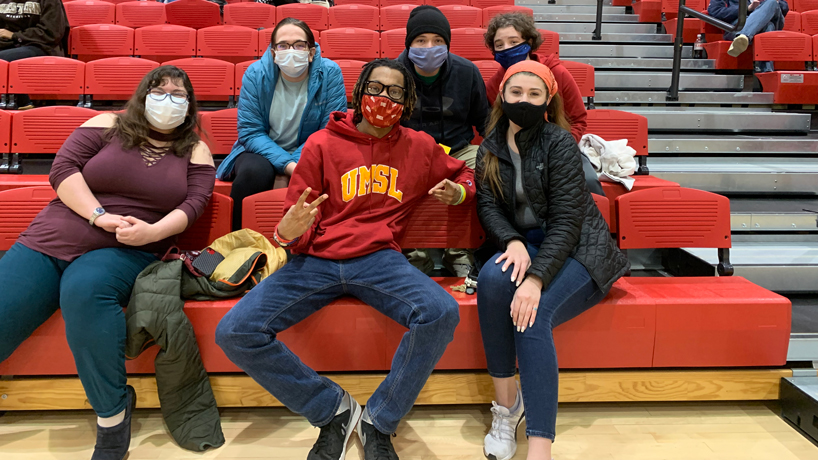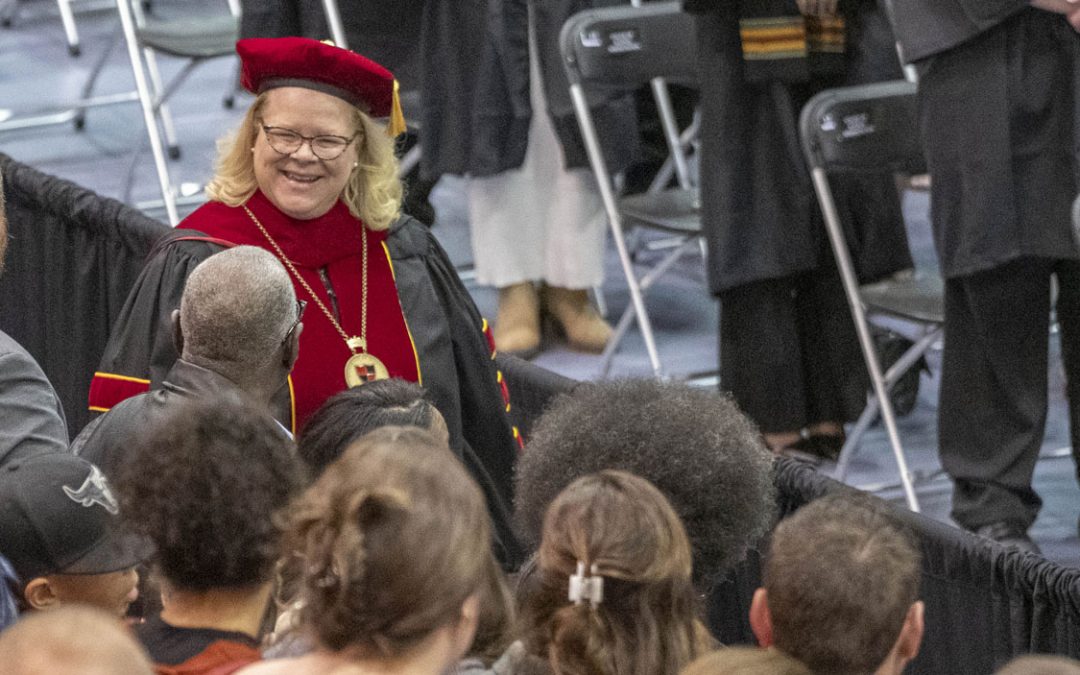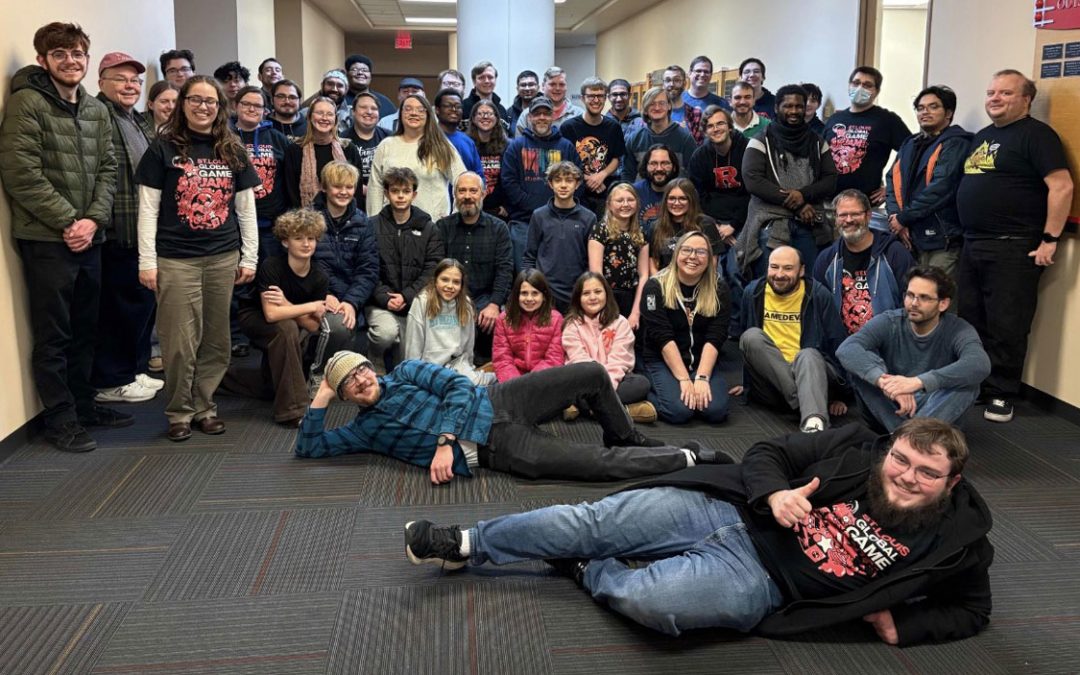
Sabrina Kraus (left) and Tyler Haynes (center) enjoy a Tritons basketball game with fellow members of the inaugural UMSL Social Peers cohort. This past school year, 18 students joined the yearlong program, which pairs full-time undergraduate students from across campus with students in the Succeed Program based on common interests to foster a more inclusive community. (Photo courtesy of Lindsay Athamanah)
Sabrina Kraus was living on her own for the first time last fall after transferring from a community college to the University of Missouri–St. Louis.
Navigating a new school was difficult enough, but Kraus was also struggling to make connections with others during the awkward, shifting circumstances of the COVID-19 pandemic. She wasn’t sure what to do until an email about UMSL Social Peers appeared in her inbox.
At first, as a pre-social work student, Kraus thought it would be an academic opportunity, something to add to her resume. However, after researching the program, she realized the goal was to form friendships between peers she may not typically encounter on campus.
“Needless to say, I was immediately on board if I got to make a friend from participating,” Kraus said. “I am glad that I did.”
She was one of 18 students to join the inaugural UMSL Social Peers cohort during the 2021-22 school year. Co-directors Lindsay Athamanah, assistant professor of special education, and Madeline Siener, UMSL Succeed student support specialist, hope to expand the program, which is housed in the College of Education, this coming school year.
The yearlong program pairs full-time undergraduate students from across campus with students in the Succeed Program, which provides post-secondary education to students with intellectual and developmental disabilities, based on common interests to foster a more inclusive community.
“It’s really a program to promote inclusivity and a more cohesive campus community,” Athamanah said, “and to help students without disabilities to really learn, work and socialize with people with disabilities because a lot of times we don’t give people that experience.”
Athamanah modeled UMSL Social Peers on a similar program she ran as a postdoctoral fellow at Michigan State University. At the beginning of the fall semester, she and Siener hold an initial meet-and-greet, where each student spends a few minutes getting to know everyone else. Afterward, they’re matched for compatibility.
The undergraduate students also receive some preliminary guidance before they start interacting with their peer.
“Because it is a yearlong program, the undergrads without disabilities go through a disability awareness and etiquette training,” Athamanah said. “They learn more about disability and friendship and how to be a good friend versus a social worker or a teacher.”
Throughout the school year, each pair meets once a week for at least 30 minutes in-person, on or off campus, or via Zoom. Athamanah noted that the Nosh in the Millennium Student Center was a particularly popular meeting spot for the first cohort. Because it’s a much-frequented area of campus, both undergraduate and Succeed students would often run into other friends, expanding everyone’s social network even further. It’s where Tyler Haynes, a Succeed student, and his partner, Hannah, met most often.
At first, Kraus and her partner, Megan, mostly met to talk in communal places on campus, but eventually they started visiting each other’s apartments. On a few occasions, they also met to have breakfast or coffee before their classes. Destiny Trent, a Succeed student, and her partner, Amy, bonded over lunch or dinner each week.
The students also attend monthly group social events, which have included watching a Tritons basketball game, taking part in homecoming activities, bowling at Tropicana Lanes and decorating cookies during the holiday season.
“The social events are not just socializing with each other and getting to know other people on campus, but also to promote that inclusivity and acceptance on campus and for people to become more aware that there are other people out there that are not just who you see in your class,” Athamanah said.
For Kraus and Haynes, the basketball game was one of the highlights of the program.
“I had never attended any college sports event before but enjoyed getting to see a different side of my friend as she filled me in with what was going on in the game and being a part of UMSL in a way I never had before,” she said.
Trent enjoyed getting to know Amy and her family.
“My favorite memory from the program is how every time after break Amy and I would talk about what we did,” she recalled. “Hearing her talk about her friends and family the way she did was super inspiring and sweet.”
The program provides support for all participants, as well. The undergraduate students each check in with peer coordinators once a week to discuss any difficulties and how things are progressing. Likewise, the Succeed students speak with a social coach every week. It provides a support structure while still allowing students to grow and develop friendships on their own.
“The whole program is built around the self-determination theory and really building that autonomy, comfort level and connectedness,” Athamanah said.
It took three or four meetings before Kraus really connected with her partner, but after that, they became great friends and learned a lot from each other.
“I think the biggest thing I learned, however, is that two very different people can share very similar experiences and turn into friends, but only if they both take that chance,” Kraus said. “I think many of us look at others we deem different from ourselves and on some level assume that those differences serve as obstacles to connecting or understanding one another.”
Haynes and Trent said the program showed them the importance of expanding their social circles. Haynes also noted that it helped show the value of the Succeed Program, while Trent felt inspired by her partner’s compassionate nature.
These experiences illustrate the impact the program can have, especially for the undergraduate students. Athamanah said that it really showcases what eliminating hierarchic structures and putting everyone on the same level can accomplish.
This year, Athamanah aims to attract more students to the program. There are plans to add more athletic events and a volunteer project to the slate of monthly group events. She added that there will also be a greater focus on pairing students who live on campus and those who are commuters to ease logistics for everyone.
During the first three weeks of the school year, there will be a recruitment drive, and the first meet-and-greet is scheduled for the first week of September. Those interested can find more information on the UMSL Social Peers website.
“I would absolutely recommend this program to other UMSL students,” Kraus said. “I know that it may seem like a big commitment, but I really think that the happiness you can get from making a new friend is more than worth it.”














